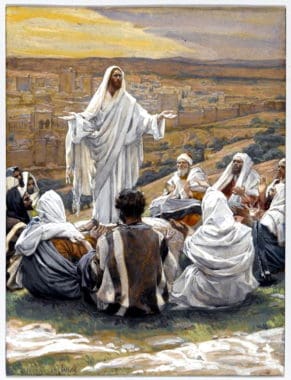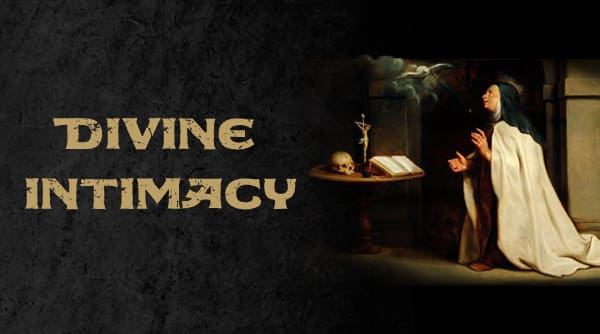Vocal Prayer
Presence of God – Lord, teach me to pray!
MEDITATION
When one of His disciples said to Jesus, “Lord, teach us to pray” (Luke 11:1), He taught them a very simple vocal prayer: the Our Father. It is certainly the most sublime formula possible and contains the whole essence of the most elevated mental prayer. However, Jesus gave it as a  formula for vocal prayer: “When you pray, say …” (Luke 11:2). This is enough to make us understand the value and importance of vocal prayer, which is within the reach of everyone—even children, the uneducated, the sick, the weary…. But we must realize that vocal prayer does not consist only in the repetition of a certain formula. If this were true, we should have a recitation but not a prayer, for prayer always requires a movement, an elevation of the soul toward God. In this sense, Jesus instructed His disciples: “When thou shalt pray, enter into thy chamber, and having shut the door, pray to thy Father in secret…. And when you are praying, speak not much as the heathens” (Matthew 6:6,7). It is interesting to note that in St. Matthew these prescriptions concerning the exterior and interior dispositions necessary for well-made prayer immediately precede the teaching of the Pater Noster.
formula for vocal prayer: “When you pray, say …” (Luke 11:2). This is enough to make us understand the value and importance of vocal prayer, which is within the reach of everyone—even children, the uneducated, the sick, the weary…. But we must realize that vocal prayer does not consist only in the repetition of a certain formula. If this were true, we should have a recitation but not a prayer, for prayer always requires a movement, an elevation of the soul toward God. In this sense, Jesus instructed His disciples: “When thou shalt pray, enter into thy chamber, and having shut the door, pray to thy Father in secret…. And when you are praying, speak not much as the heathens” (Matthew 6:6,7). It is interesting to note that in St. Matthew these prescriptions concerning the exterior and interior dispositions necessary for well-made prayer immediately precede the teaching of the Pater Noster.
Therefore, in order that our vocal prayer be real prayer, we must first recollect ourselves in the presence of God, approach Him, and make contact with Him. Only when we have such dispositions will the words we pronounce with our lips express our interior devotion and be able to sustain and nourish it. Unfortunately, inclined as we are to grasp the material part of things instead of the spiritual, it is only too easy in our vocal prayer to content ourselves with a mechanical recitation, without taking care to direct our heart to God; hence we should always be vigilant and alert. Vocal prayer made only by the lips dissipates and wearies the soul instead of recollecting it in God; it cannot be said that this is a means of uniting us more closely to Him.
COLLOQUY
“Never permit it to be thought right, my God, that those who come to speak with You do it with their lips alone.
“I must not be unmannerly because You are good, addressing You in the same careless way I might adopt in speaking to a peasant. If only to show You my gratitude for enduring my foul odor and allowing one like myself to come near You, it is well that I should try to realize who You are ….
“O my Emperor, Supreme Power, Supreme Goodness, Wisdom itself, without beginning, without end, and without measure in Your works; infinite are these and incomprehensible, a fathomless ocean of wonders, O Beauty, containing within Yourself all beauties. O very Strength. God help me. Would that I could command all the eloquence of mortals and all wisdom, so as to understand, as far as is possible here below, that to know nothing is everything, and thus to describe some of the many things on which we may meditate in order to learn something of Your nature, my Lord and my God.
“When we approach You, then, let us try to realize who You are with whom we are about to speak. If we had a thousand lives we should never fully understand what are Your merits, Lord, and how we should behave before You, before whom the angels tremble…. We cannot approach a prince and address him in a careless way. Shall less respect be paid then to You, my Spouse, than to men?… I cannot distinguish mental prayer from vocal prayer when faithfully recited with a realization that it is You, O Lord, that we are addressing. Further, are we not under the obligation of trying to pray attentively?” (Teresa of Jesus, Way of Perfection, 22-24).
+
 Note from Dan: These posts are provided courtesy of Baronius Press and contain one of two meditations for the day. If you would like to get the full meditation from one of the best daily meditation works ever compiled, you can learn more here: Divine Intimacy. Please honor those who support us by purchasing and promoting their products.
Note from Dan: These posts are provided courtesy of Baronius Press and contain one of two meditations for the day. If you would like to get the full meditation from one of the best daily meditation works ever compiled, you can learn more here: Divine Intimacy. Please honor those who support us by purchasing and promoting their products.
Art for this post on vocal prayer: The Lord’s Prayer, James Tissot, between 1886 and 1894, PD-US author’s life plus 100 years or less, Wikimedia Commons. Father Gabriel of St. Mary Magdalen, mirror from open source material.




